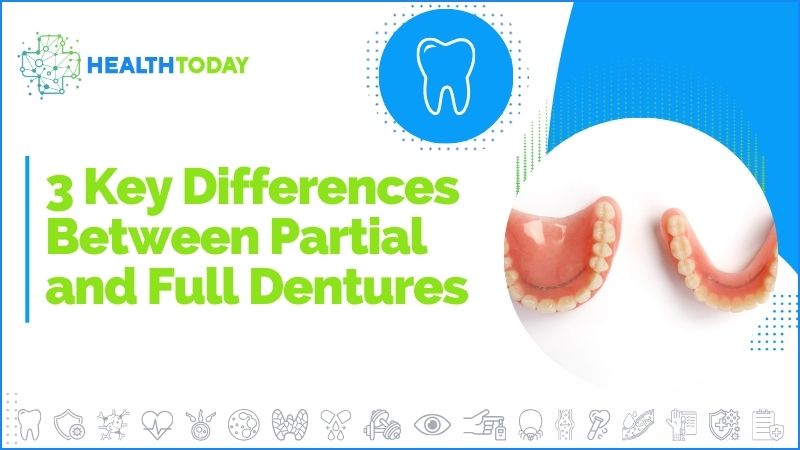
Choosing between partial and full dentures is an important decision that impacts your oral health, comfort, and appearance. At Health Today in Calgary, we help you understand the key differences between these options. Partial dentures are ideal if you have some natural teeth remaining, offering added support and a more secure fit. Full dentures, designed for those missing an entire arch of teeth, provide complete coverage and restore full functionality. Both types of dentures are crafted to deliver a natural-looking smile, but the choice depends on your specific needs. Trust Health Today to guide you through selecting the right dentures, ensuring you regain confidence in your smile and comfort in your daily life.
When it comes to restoring your smile and maintaining oral health, dentures can be a life-changing solution. However, the decision between partial and full dentures is one that requires thoughtful consideration. Each option offers distinct benefits and caters to different needs. In this blog, we’ll explore the three key differences between partial and full dentures, helping you make an informed choice that suits your unique situation.
One of the most significant differences between partial and full dentures is the coverage they provide. Full dentures are designed to replace an entire arch of missing teeth, whether it's the upper, lower, or both. These dentures sit directly on the gums and are supported by the underlying bone structure. Full dentures are often the best option for individuals who have lost all or most of their teeth in a particular arch.
On the other hand, partial dentures are used when some natural teeth remain. These dentures fill in the gaps left by missing teeth while preserving the remaining healthy teeth. Partial dentures typically consist of replacement teeth attached to a gum-colored plastic base, which may be connected by a metal framework that holds the denture in place. The remaining natural teeth provide additional support and stability for the partial denture, which can make it more secure and comfortable for daily use.
Understanding the difference in coverage and support is crucial, as it directly impacts how the dentures will feel and function in your mouth. If you have healthy teeth remaining, partial dentures might be the best option to maintain as much of your natural smile as possible.
The functionality and fit of dentures are key considerations when choosing between partial and full dentures. Full dentures are designed to restore the full function of your mouth, allowing you to eat, speak, and smile with confidence. However, because they rely entirely on the gums and bone structure for support, they may require an adjustment period as you get used to wearing them. Over time, the bone structure under the gums can change, which might affect the fit of full dentures and necessitate periodic adjustments or replacements.
Partial dentures, in contrast, tend to offer a more secure fit due to their reliance on remaining natural teeth for support. This often results in better functionality, as the partial denture works in conjunction with your natural teeth to enhance chewing and speaking. Additionally, because partial dentures do not cover the entire gum line, they can feel less bulky in the mouth, making the adjustment period shorter and more comfortable.
It’s important to remember that both types of dentures require proper care and regular dental visits to ensure they maintain their fit and functionality. Consulting with a dental professional can help you determine which option will best meet your needs for long-term comfort and usability.
When it comes to aesthetics, both partial and full dentures are designed to provide a natural-looking smile, but they achieve this in different ways. Full dentures replace all the teeth in an arch, giving you a completely new set of teeth. Modern full dentures are made with advanced materials that mimic the appearance of natural teeth, including options for tooth shape, color, and even the texture of the gums. This allows for a highly personalized approach to restoring your smile.
Partial dentures, while also designed to look natural, blend with your existing teeth. The artificial teeth are carefully matched to the color and shape of your remaining teeth, ensuring a seamless and natural appearance. Because they only replace the missing teeth, partial dentures allow you to retain as much of your natural smile as possible, which can be important for your overall self-esteem and confidence.
Whether you choose partial or full dentures, working closely with your dentist to select the right materials and design will ensure that your new smile feels authentic and enhances your appearance.
Deciding between partial and full dentures is a personal choice that depends on various factors, including the number of missing teeth, the condition of your remaining teeth, and your preferences for comfort, functionality, and aesthetics. By understanding the key differences in coverage, functionality, and aesthetics, you can make an informed decision that best suits your needs.
At Health Today in Calgary, we’re committed to helping you achieve a healthy and beautiful smile. Whether you need partial or full dentures, our team is here to guide you through the process, ensuring you receive the best possible care. Contact us today to schedule a consultation and take the first step toward restoring your smile with confidence.
Written on behalf of Health Today.